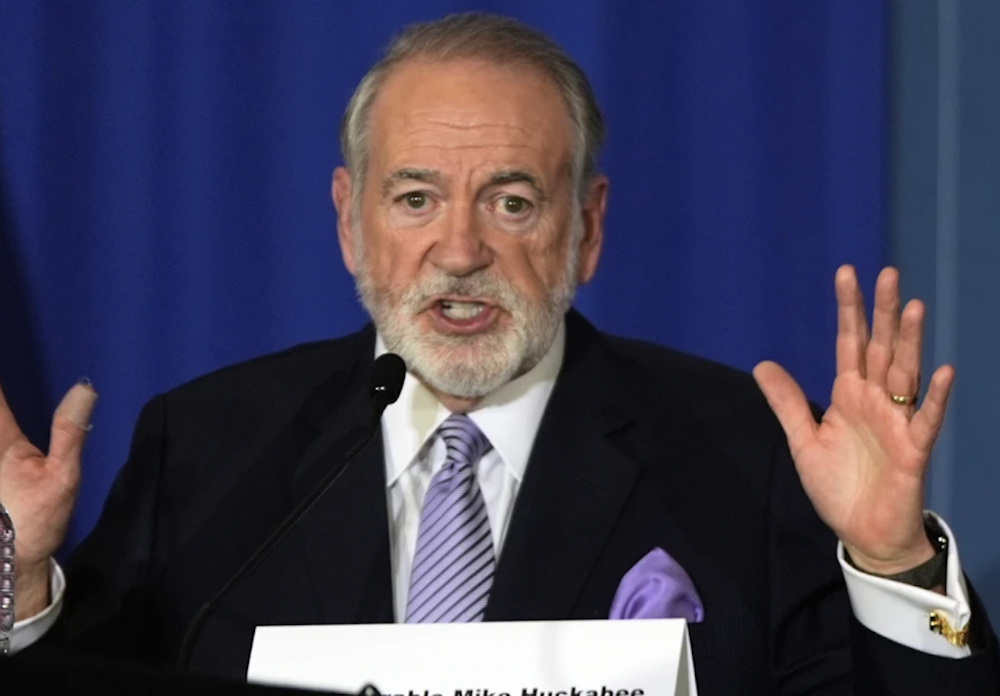US doesn't need Israeli permission to strike deal with Yemen: Huckabee
The US Ambassador to "Israel" maintains that American intervention in Yemen's attacks would depend on whether US citizens are harmed.
-

Former Arkansas Governor Mike Huckabee gestures at a campaign event in Drexel Hill, Pennsylvania, on October 29, 2024. (AP)
United States Ambassador to "Israel" Mike Huckabee believes that after consulting with US President Donald Trump and US Vice President JD Vance, Washington's actions against Ansar Allah's attacks on the entity will depend on whether American citizens are harmed, Channel 12 reported.
“Here’s what I can tell you, because I had a conversation with both the president and the vice president last night,” Huckabee explained, adding that “there’s 700,000 Americans living in Israel, if the Houthis want to continue doing things to Israel and they hurt an American, then it becomes our business."
When asked by the Israeli channel to explain whether he meant that only if a Yemeni missile strikes an American person would the US intervene to fight the group, the ambassador answered, "It's a matter of what becomes our immediate business."
Meanwhile, Huckabee emphasized that the United States does not need "Israel’s" approval to negotiate an arrangement aimed at stopping Yemeni attacks on American ships.
"The United States isn't required to get permission from Israel to make some type of arrangement that would get the Houthis from firing on our ships," the ambassador says in a clip from an interview that will appear this weekend on the Israeli Channel 12 news, the Times of Israel reported.
His remarks come after Trump announced a drastic shift in strategy: the US will suspend military operations against Ansar Allah in exchange for a pause in attacks on American naval assets. The limited agreement, mediated in part by Oman, applies only to attacks targeting US ships and does not cover strikes against "Israel" or commercial vessels.
Yemen's impactful ops. forced US to halt aggression: Sayyed al-Houthi
The United States' failure to affect Yemen’s military operations in support of the Palestinian Resistance in Gaza compelled Washington to opt for halting its aggression on the country, pointed out the leader of Yemen’s Ansar Allah movement, Sayyed Abdul-Malik al-Houthi.
In a speech delivered Thursday, Sayyed al-Houthi stressed that Yemen’s position was not, as claimed by US President Donald Trump, based on “pleading or surrender.”
He reiterated that “Yemen’s declared and clear priority is to support the Palestinian people against the occupation,” asserting that Sanaa's stance remains “fully steadfast when it comes to support, whether through strikes deep into occupied Palestine or through the blockade on Israeli vessels.”
The Ansar Allah leader also affirmed Yemen’s full readiness to confront any new round of American aggression.
US operation against Yemen exceeded $1 bln in costs: NBC News
US President Donald Trump’s military campaign against Yemen’s Ansar Allah movement has cost the United States more than $1 billion since mid-March, according to two US officials familiar with internal briefings, as reported by NBC News.
Despite the massive expenditure, the operation failed to dismantle Ansar Allah’s ability to strike, a fact evident in the recent missile attack targeting "Israel’s" Ben Gurion Airport.
Launched on March 15 and dubbed Operation Rough Rider, the campaign was meant to escalate pressure on the Yemeni Resistance. But after weeks of air and naval strikes, Ansar Allah has retained its operational capabilities well beyond Yemen’s borders.
Intelligence gaps, drone losses hinder the US campaign
An unnamed US official admitted the administration had been seeking an exit through this agreement. “The administration was clearly looking for an off-ramp for this campaign against Ansar Allah,” the official said.
The Pentagon has fired roughly 2,000 munitions in the operation, including more than 75 Tomahawk missiles, hundreds of 2,000-pound bombs, and at least 20 AGM-158 air-launched cruise missiles, at a cost exceeding $775 million, as per the report. Transport and support costs for deploying two Patriot missile defense systems added millions more, with 73 C-17 flights required just to deliver one of the systems.
Despite this, officials say the effectiveness of the strikes has been difficult to verify. US drones sent to assess damage were often downed by Ansar Allah, and the lack of American boots on the ground has left intelligence severely limited.
Dana Stroul, a former Pentagon official under the Biden administration now with the Washington Institute, insinuated that the outcome was predictable, saying, “Washington has little patience and a short attention span, and was unlikely to commit the sustained resources or leadership attention needed for a meaningful result.”

 5 Min Read
5 Min Read








